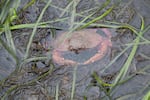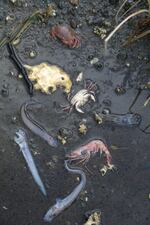
A crab struggles for air in Hood Canal, which is experiencing some of the lowest oxygen levels in recorded history.
Seth Book / Skokomish Tribe Department of Natural Resources
Marine life is struggling to survive in the oxygen-starved waters of Hood Canal.
It's common during the summer for fish to struggle for oxygen in this long, deep inlet of Puget Sound. But the lack of oxygen is at record lows, researchers say, forcing fish up out of the depths, gasping for air.
Hundreds of rockfish hovered in shallow water, listlessly crowded together to access the limited oxygen closest to the surface. Wolf eels, normally reclusive creatures, came out of their dens, "panting" so as to move water over their gills and avoid suffocating.
"We have been seeing lots and lots of dead fish on beaches," said Seth Book, with the Skokomish Tribe's Department of Natural Resources. Book has been closely monitoring the low oxygen event as it's unfolded over the summer. "We've seen hundreds and hundreds of crabs, right crammed up against the beach or crawling up into fresh water to get away from the low oxygen."
The situation in Hood Canal was exacerbated during the weekend, when strong winds over the brought deep, cold, low-oxygen water to the surface.
Video shot by a diver with the Skokomish Tribe this past weekend reveal hundreds of rockfish, which usually favor solitude and deep water, crowded into the shallows of Hood Canal.
WATCH video shot by a diver for the Skokomish Tribe of fish in Hood Canal:
The waters of Hood Canal are notoriously low in dissolved oxygen — regularly falling to levels within the “stress zone” for marine life. But this year was particularly bad.
“This is really the worst year in terms of the oxygen,” said Jan Newton, an oceanography professor at the University of Washington who has been studying Hood Canal for years. “We’ve been seeing hypoxia (low oxygen) all year and it got so severe that it was basically flat lined at zero ... for a big chunk of the summer.”
Scientists think
“the Blob” of warm water hovering off the West Coast
may be funneling warm water into Puget Sound, limiting the natural mixing that occurs in Hood Canal between cooler ocean waters and the warmer, more oxygen-rich surface waters. The hot, sunny summer triggered massive algae blooms on the coast and in Puget Sound, and the decomposing algae sucked oxygen out of the water column, further contributing to dead zones.
But as disconcerting as the oxygen levels are, the extent of the fish kill that occurred this year is not as bad as kills that have been documented in previous low-oxygen years, such as 2006 and 2010. Scientists aren’t sure exactly why that’s the case.

Researchers say record low oxygen levels in Hood Canal are causing marine life to die off.
Seth Book / Skokomish Tribe Department of Natural Resources
Winds over Hood Canal normally help stir up the water column, bringing lower-oxygen waters closer to the surface, where oxygen levels are higher. But the severe wind that occurred over the weekend was more of a high-speed blender than a gentle whisking, rapidly bringing large amounts of low-oxygen water to the surface, eliminating refuge for fish.
“It’s bad news if you’re caught in it, but in the long run it’s a good thing,” Newton said, adding that Hood Canal was due for a mixing after a warm, stagnant year.
“I’m really glad we didn’t have a worse fishkill out there but I am not sure that we’re out of the woods yet.” Newton explained that the data coming in from monitoring buoys stationed around Puget Sound continue to show very low oxygen levels in Hood Canal.
“So if this whole dynamic repeats itself again with the winds continuing we could see some more mortality,” she said. “Hopefully not, hopefully we’ll dodge another bullet.”